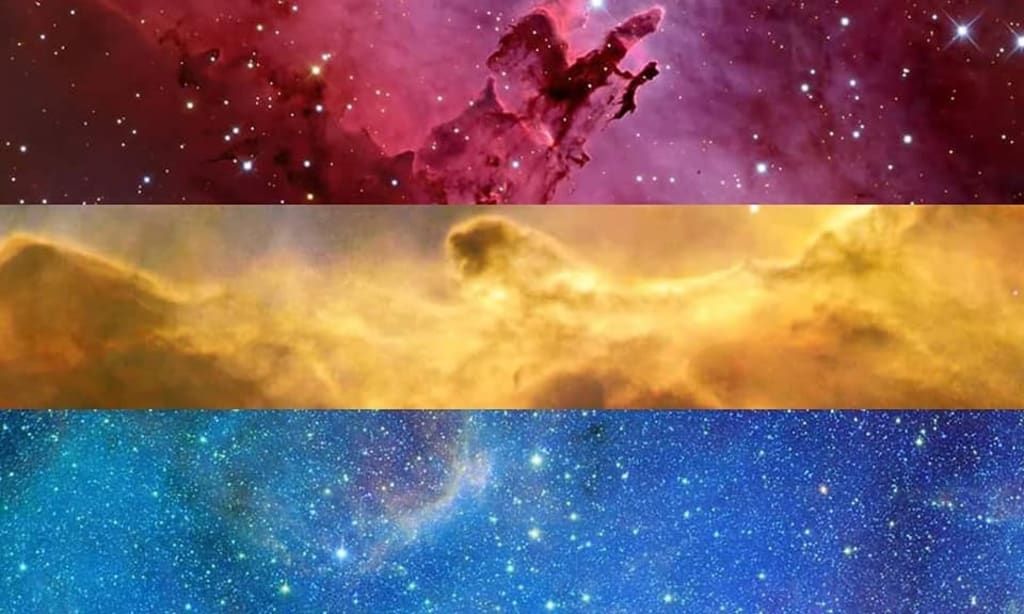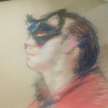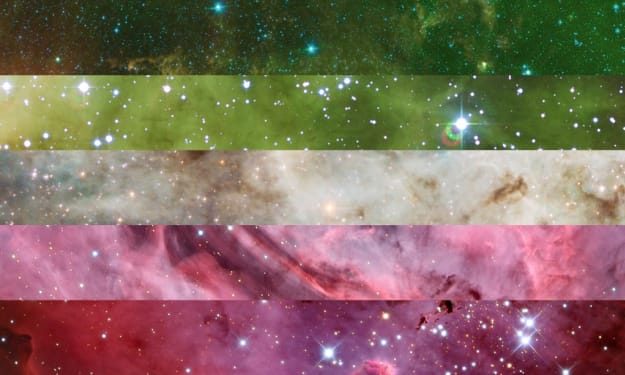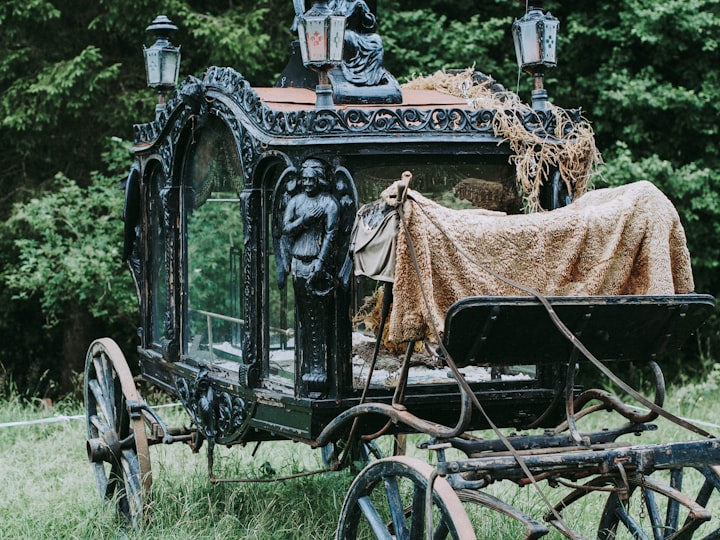TREKS & GENDER: Sexual Identity in the Final Frontier (a VENUS VALLEY chapter)
Queer Philosophers’ Forum, pt. 16

Yes, before anyone wonders, I have noticed these chapters are longer when I’m indulging my fandoms, like Shakespeare and The Matrix! (If you haven’t, you can see me do that by clicking HERE & HERE). So welcome, queerly beloveds, to the geeky Trekkie chapter of my book-in-progress - in which, as always, your inputs and insights become my edits as you debate, discuss, question, contribute, so your voices and viewpoints become part of the finished published product:VENUS VALLEY, Queer Philosophers’ Forum.
Having Star Trek to watch already saved my mental health once, when I was bullied as a kid for being “girly”, before I even knew why I had such a strong girly side. Rewatching it all after I came out, and embraced my full femalehood, alongside my wife who also embraced her own bisexual coming out, did it again. Let’s cast a queer eye over those space guys!
THE CLASSICS: ACCIDENTAL ALLIES
Star Trek started out with a complicated relationship to sex, to say the least. On the one hand, women worked alongside men as equals in creator Gene Roddenberry’s future vision of the show, even with interracial romance. On the other hand, TV studios and audiences wanted a ladies' man hero who always got the girl, and Gene had plenty of experience with his actresses to base the character on! The dilemma was solved by using sexy space bikini girls to distract the censors from the themes that criticised modern American society. Trek has imperfectly tried to be progressive ever since, especially when it comes to queer content.
The first pilot episode The Cage (and the later 2-parter that reused its footage, The Menagerie) had aliens whose faces were played by women but whose voices were played by men, to show how they'd become mentally strong but physically weak. And the original series finale Turnabout Intruder had an alien device that forced a man and a woman to swap bodies and minds, meant to show the chaos that ensues unless men and women play the roles they were equipped for. But these actually opened up genuine real-world conversations among psychologists about the idea of "a man's mind in a woman's body" & vice versa, without even meaning to.
In the movies, Will Decker & his lover Ilia were merged into a single alien energy being; Kirk's son David was played by openly gay actor Merritt Buttrick, whose career was cut short by HIV/AIDS; queer icon David Bowie’s model wife Iman played a shapeshifter who shifts into both male & female shapes; and a planned replacement character for Spock became his protege instead, played by two women, but with the conventionally male Vulcan name “Mr.” Saavik left in the script. I could write a lot more about “Mr.” Saavik’s first actress Kirstie Alley’s journey from Playboy to Scientology; but, ironically for a Star Trek chapter, I only have limited space and time! (I might add an extra chapter, if what I find when I read up on it is, as Spock would say, “fascinating”).
The animated series that bridged the gap between the last episode & the first movie, managed one episode about an alien aphrodisiac and one moment when the women in the crew finally got to take command of the ship. But what that era really gave queer culture, was FAN FICTION.
MARY SUE - the sexist stereotype, that says female characters who can do everything the male characters can do, are unrealistic - started life as a Trek fan fiction magazine story character. And SHIPPING - putting your two favourite characters together romantically or sexually in ways the show never would or could (or sometimes even should) - began with gay fans 'shipping Kirk & Spock. In his novel of Star Trek: The Motion Picture, Gene Roddenberry had Spock call Kirk his T'hy'la - brother-lover-friend - one whose love transcends all those different kinds of love. In The Motion Picture itself, Spock is knocked into a coma by the machine-mind V'Ger; he wakes to find Jim by his bedside, takes his hand, sheds a tear, and says, "This simple feeling is beyond V'Ger's comprehension."
NEXT GENERATIONS: THERE WAS AN ATTEMPT
The Next Generation, Deep Space 9 and Voyager took leaps forward in giving women more leading roles and more layered personalities - finally allowing women to command starships, with a deferential "yes, ma'am," from their crew - but storylines addressing progressive gender attitudes were pretty far between, and didn't quite go far enough. Whether that was because of Gene Roddenberry's involvement/interference, or in spite of it, is still up for debate depending whose side of the story you hear!
In THE NEXT GENERATION episode The Offspring, android Data creates himself an android child, Lal, allowing it to choose its own apparent sex. The experiment is a failure as she’s unable to process the emotions of growing up like a human girl. In The Outcast, the ever-horny Will Riker empowers a young rebel, Soren, from a race who enforce androgyny, to embrace sexuality. Again the experiment is a failure, and Soren submits to "therapy" to keep the peace. And in The Host, Dr. Beverly Crusher's lover, Odan, is a Trill - a race who live as symbionts inside humanoid hosts, transferring and joining their personality to a new host when each one dies. When Odan is a man, the good Doctor is all set, but when the new host is a woman with the same thoughts and feelings, she walks away. To be fair to the actors, they've all said the stories would've gone differently if they'd had more say in it. Especially Jonathan Frakes playing Riker, who pushed for his androgynous lover Soren to be played by a man; and Gates McFadden playing Dr. Crusher, who told fans it was the shock of the change that drove her away from Odan's new persona, not her gender.
(Quick side note: Data pretty famously says he's "fully functional, programmed in multipe techniques" when it comes to sex; but - even though he's played by a man - was it ever fully established that the functioning parts were those of a cisgender male?)
In DS9, the Trill really come into their own with Dax, whose sexy new lady hosts Jadzia and Ezri reintroduce themselves to friends and fellow officers who once knew Dax as "Old Man" Curzon, and who all joyfully embrace the change with hugs and laughter. Except when Curzon's ex-wife reappears in Rejoined, and rekindles her romance with Jadzia, giving us Star Trek's first lesbian kiss; true to form, the relationship is doomed. Meanwhile, Jadzia's rejected admirer (but Ezri's eventual lover), hopeless romantic Dr. Julian Bashir, has an enemies-to-friends relationship with Cardassian spy Garak, whose actor Andrew Robinson happily says he always played their scenes as if he was flirting with his "dear doctor", even if he never said it out loud on screen. The Changelings and the Prophets, the two races worshipped by the humanoids around them, are bodiless and able to appear in male or female shape. All of that, alongside the series’ other leading lady Kira Nerys having a bisexual, hypersexual, alter ego in a dark mirror universe, gave the show its reputation as the most Queer Coded and Queer Baited Trek of its time, if not the whole franchise (for a deeper dive into what Queer Coding & Queer Baiting are and how they present in fantasy & futuristic fiction, peek back at my last chapter by clicking HERE). Nana Visitor, playing Kira, survived a sexual assault just before starting filming the series, and channelled her trauma into her performance as a survivor of war.
(But the less said about the disastrously dated gender-bender "comedy" episodes with the Ferengi, the better!)
VOYAGER was already making waves in its early seasons for having a woman in the Captain's Chair; but it really came into its own when Captain Kathryn Janeway's surrogate daughter character, Kes, was cut from the cast, and the individualistic Seven of Nine not only replaced her but almost singlehandedly became the show's main character. Actress Kate Mulgrew had just as troublesome a transition from working with younger Jennifer Lien to the more mature Jeri Ryan, but their on-screen and off-screen relationships grew into something powerful and beautiful. Seven was never given any openly queer storylines yet (unless you count the time the male-presenting holographic Doctor’s consciousness was transferred into her, in Body & Soul); but her struggle to regain her humanity and identity, after being absorbed into the cybernetic slavery of the Borg Collective, spoke to transgender viewers, autistic viewers, and those who'd escaped controlling cults, in ways that still make her a fan favourite today.
THE PREQUELS: STEPS FORWARD, STEPS BACK
With the 80s & 90s Trek era at an end, the next decade or more of Trek content was a reimagining of its beginnings. ENTERPRISE picked up where the movie First Contact left off with the first meeting of Human & Vulcan spacecraft (after a time-travelling attempt by the Borg to stop it was foiled by TNG's U.S.S. Enterprise and DS9's U.S.S. Defiant), to tell the origin story of Starfleet. The best Enterprise could do with sex and gender was Unexpected, pretty much a comedy episode about a man getting unexpectedly pregnant. Cogenitor, in which the aliens-of-the-week subjugate their third gender to use for breeding; and trying to open the eyes of one to their own right to freedom, drives one to suicide when they know they can't have it. And Stigma, a rehash of unused TNG script Blood and Fire, in which a disease contracted by telepathy without consent, whose sufferers are exiled by Vulcan society, tries to be a metaphor for HIV/AIDS. The gleefully polyamorous Dr. Phlox was a series highlight though, I’ll give them that.
The movie trilogy that picked up where it left off, retelling original series stories starting with Kirk’s and Spock’s childhoods, made its only blink-&-you'll-miss-it queer moment a tribute to proud gay activist and original Star Trek star George Takei, by showing his character Sulu walking happily with a husband and child.
(To hear from classic Trek’s other trailblazing activist Nichelle Nichols, click HERE)
NU-TREK - WHEN TREK GOES "WOKE"
After too long a wait, we're spoilt for choice for Trek content on streaming services now - and everyone who hates it, wants everyone who loves it, to know how "woke" they all think it is, now that the series (whose every episode and movie has been a political, religious, or sexual allegory consistently since 1966) has suddenly "gone political". What they're complaining about, as far as I can tell, is that instead of sex and gender being tackled as the centre theme of Very Special Episodes, every new series now stars queer actors and characters whose queerness isn't the dramatic defining trait of their whole story. Mariner's relationship with Jennifer, in Lower Decks; Seven's relationship with Raffi, in Picard; transgender actress Jesse James Keitel's nonbinary space pirate character Angel, and flirts-with-any-gender Nurse Chapel, in Strange New Worlds; Paul Stamets and his husband Dr. Hugh Culber adopting nonbinary Trill host Adira and their transgender partner Grey, in Discovery. The studio might have made the writers of Prodigy play it safe with season 1 as it's aimed at kids, but I'm optimistic and I can't wait to see what they've come up with for season 2!
For those who say it's not what Gene Roddenberry would’ve wanted his legacy to become (or "betraying Gene's vision", as they dramatically put it), here's the man himself in writer Yvonne Ford's book Inside the Mind of Gene Roddenberry, written together with Gene and his wife (and iconic Star Trek actress) Majel Barrett Roddenberry, before he died:
"Because I know that there must be many joys and pleasures and degrees of closeness in those relationships... I'm in the midst of making a decision about homosexuality, male and female, and how we are going to treat it on Star Trek, the lovely way in which we will treat it, without defying present average conventions... A little at a time. People have to get used to these things. They have to get used to a certain liberation of thought, in the same manner as captive animals need to get used to freedom when you let them out of their cages. Suddenly they've got to survive in a world of options. Nobody's going to tell them that this or that option is bad or good. They'll have to try different things, and see if something works. And if it doesn't, what should they do next? Oh yes, a whole world opens up."
That's the big difference for me between a typical UTOPIA - an imaginary perfect place, the word coined by Thomas More in the 16th century, but the idea a part of philosophy from the ancient world to today - and an ongoing series like Star Trek, which is a vision of Progress, Not Perfection (which is the perfect description of how Trek's approached queerness so far!). PROGRESSIVE politics can be criticised for not knowing its own goals or never being satisfied; but this makes the mistake of assuming that it has an end in sight, a status quo that needs achieving and conserving, which is actually the hallmark of CONSERVATIVE politics (hence the name). But the clue to progressive politics is in the name, too - it wants Progress; for society to keep moving, developing, evolving. A better word for Star Trek, might be the one coined by French philosopher Charles Renouvier in 1876: UCHRONIA - an imaginary perfect TIME. Gene imagined what could be achieved, not in another better WORLD, but what we of this world could become in a better AGE; when we're capable of uniting, because all our reasons for dividing - national boundaries, money, fear of death, feeling alone in the universe - were all gone. Humans up close would still be imperfect, but humanity as a whole, once we're capable of being "humanity as a whole" - Gene called it the SOCIO-ORGANISM - could progress together onwards, upwards and outwards.
Different race, different class, different sex? We need you, because we need a different view of race, class, sex, altogether. In fact, All Together is exactly what we need. Gene Roddenberry might fit neatly into the box of “Daringly Progressive Then, But Problematically Dated Now”; but the difference with him is he knew that about himself, and he wanted Star Trek to want to grow beyond him. I.D.I.C.: Infinite Diversity in Infinite Combinations.
We've talked before about how looking back so far into our past that history breaks down, and we need to invent a fantastical past beyond it, gives us FOUNDATION MYTHS or MYTHIC DESCENT (and if you haven’t already read it, you can now, by clicking HERE). Perhaps we could say the other side of that coin, when we look far enough ahead into the future that we can't predict exactly where progress will take us, or what we'll conserve from here and now, gives us ASPIRATION MYTHS or MYTHIC ASCENT. That’s the essence, for me, of Gene Roddenberry's choice - progressive-but-imperfect human that he was - to label himself and his philosophy HUMANIST: how far we've come, from the past to the present, shows how much farther we can (boldly) go, from the present to the future. The whole of humanity is capable of achieving the best of, and the best for, the whole of humanity; but only if we achieve it as the whole of humanity.
At time of writing, there are 14,343 days to go until Uchronia begins with First Contact, according to the prime Trek timeline; and and so far we've successfully avoided the Eugenics Wars they warned us about on the way. We'll get there together!
~*~
To subscribe to catch the next one, click HERE;
To join the group in the book of faces where you can debate, discuss, question, contribute, and give your own insights and inputs that will become my edits, click HERE;
And to generously donate something big or small so I can carry on using my time to do this, and eventually publish it as a proper fully finished book, thank you for clicking HERE.
About the Creator
Mx. Stevie (or Stephen) Cole
Genderfluid
Socialist
Actor/actress
Tarot reader
Attracted to magic both practical & impractical
Writer of short stories and philosophical musings
Reader insights
Outstanding
Excellent work. Looking forward to reading more!
Top insights
Compelling and original writing
Creative use of language & vocab
Easy to read and follow
Well-structured & engaging content
Expert insights and opinions
Arguments were carefully researched and presented
Heartfelt and relatable
The story invoked strong personal emotions
On-point and relevant
Writing reflected the title & theme






Comments (1)
One of your best! Loved it! ❤️💛💙🖖